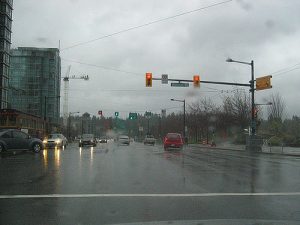 Driving always has the potential to be hazardous, and there’s no telling when you might have to take evasive action or find yourself getting into an accident due to the aggressive or distracted actions of other motorists. Still, nothing increases the potential risks you face out on the road as much as bad weather, which makes it even more essential that you pay close attention to avoid getting into an accident or getting a ticket.
Driving always has the potential to be hazardous, and there’s no telling when you might have to take evasive action or find yourself getting into an accident due to the aggressive or distracted actions of other motorists. Still, nothing increases the potential risks you face out on the road as much as bad weather, which makes it even more essential that you pay close attention to avoid getting into an accident or getting a ticket.
When hazardous weather conditions set in, the experts always recommend that you stay off the road if at all possible. Of course, there are many times when this simply isn’t possible as most people don’t have the luxury of being able to take a day off of work simply because the experts say it’s too hazardous to travel. For this reason, it’s a good idea to keep track of the weather conditions and their potential impact on driving conditions in order to lower your chances of tickets and wrecks.
Minimizing the Risk in Bad Weather
Snowy, rainy or windy conditions obviously require you to pay more attention to the road and make appropriate adjustments to your driving to lessen the risk.
- In this case, one of the best things you can do is to slow down. The law always states that you’re required to slow down to a reasonable speed whenever inclement weather conditions are present.
- It takes far longer to stop on wet roads, and the faster you travel, the greater the stopping time and distance will be.
- Also, should a car in front of you suddenly brake, you’ll have a much better chance of avoiding a collision if you’re travelling more slowly.
- Unfortunately, if you do crash into a car in front of you, there is a high chance you could be ticketed for following too closely or driving too fast for the conditions.
This means that failing to slow down to a weather-appropriate speed could see you ticketed for driving too fast for the conditions even when you’re driving at or below the posted speed limit. Similarly, it’s also a good idea to increase the distance between you and any cars in front of you to help compensate for the increased stopping times and avoid getting ticketed for following too closely.
Avoiding Potential Hazards
When you do find yourself having to head out on the road in bad weather, you can also work to avoid potentially hazardous situations by being smart about your driving decisions and route.
If you’ve lived in the same area for any amount of time, you are surely aware of some roads, intersections and areas that tend to be more dangerous or are frequent sites of accidents.
- Since you already know that there is an increased risk of accident in these areas, it generally always makes sense to avoid them during bad weather if at all possible.
- For instance, if a certain intersection always becomes slick and icy during a snowstorm, it’s never a bad idea to plan an alternate route that avoids it if possible.
- Similarly, if a particular stretch of road suffers from poor drainage issues and often floods during rain storms, trying to avoid this road can help to prevent your car from stalling and getting stuck in the water.
Your smartphone can also be a huge help in avoiding hazardous driving conditions.
- There are numerous apps that provide continuous weather alerts, which can be used to allow you to plan an alternate route or avoid getting caught in a major blizzard, thunderstorm, tornado or any other severe storm.
Although it may sound obvious, avoiding potentially dangerous driving conditions and severe storms is definitely the easiest way to lower your risk of weather-induced tickets and accidents. Of course, all drivers are bound to face bad weather at least occasionally, in which slowing down and driving more carefully is obviously the best option.
[Image: https://www.flickr.com/photos/roland/8383511/]
Scott Desind
Latest posts by Scott Desind (see all)
- How to Request the County Seat and Fight Your California Traffic Ticket - May 21, 2023
- Don’t Even Touch That Cell Phone - July 13, 2022
- Innocent Until Proven Guilty - March 2, 2020

